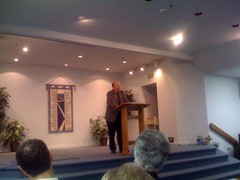 I’m at the “Missional Christianity … Church Beyond Boundaries” Conference at Biblical Seminary. It will conclude with John Franke being installed as the Lester and Kay Clemens Professorship in Missional Theology. (Since my friends and have referred to it as the Franke installation, and they’re here and generally the only ones who read this blog, I’ll probably refer to it as the Franke Installation. If you are reading this and do not fall into the sentence, you are now not confused, right?)
I’m at the “Missional Christianity … Church Beyond Boundaries” Conference at Biblical Seminary. It will conclude with John Franke being installed as the Lester and Kay Clemens Professorship in Missional Theology. (Since my friends and have referred to it as the Franke installation, and they’re here and generally the only ones who read this blog, I’ll probably refer to it as the Franke Installation. If you are reading this and do not fall into the sentence, you are now not confused, right?)
Scot McKnight gave the first Plenary Session and here are my rough notes from it. (I’m practicing my live-blogging skills for the emergent conference, which by the way, Tim Keel is in the house).
Scot McKnight – “The Bible and Missional Listening”
Franke is on the cutting edge of doing theology from a missional perspective.
Illustration – Art school piece – like the artist – who says something deep from within the soul and so we gaze upon the text.
The Bible is God’s story.
Look, see, respond
A Model called authority
Too many stop short by asking how can I understand and what method do I use
The Drama of Doctrine – Kevin VanHoozer …
these are not good enough questions
(Scot) grew up with a fundamentalist perspective
these are the words that lead to a framing story: god revelation inerrancy, authority submission revealed himself in the bible to make sure they got it right … and so I believe the bible is true formula of words
fosters a relationship to the bible that demand submission.
focusing on the subject matter is not enough
A Model Called Relationship
instead one that leads to a missional dance.
1. Distinguishes God from the Bible the person and the paper are not the same. missing the difference of God and the Bible is like reading Jonah and wondering how long human beings living inside whales the book is about Jonah and God not Jonah and the whale God speaks to us in words but is more
2. It is a written communication to us in the form of words God is not the Bible to make the Bible into God is idolatrous Francis Schaeffer – He is there and is not silent
3. to listen to God the person, speak in the Bible and engage God as we listen wiki stories – the ongoing story … divinely guided so their wiki stories tell God’s stories
4. relational approach believes we enter into the discussion the Bible has and the Church has had with it.
If we learn read the Bible with generation, it’s more like sitting down at the table with 3 generations, we are enriched with deeper understanding of family relational way is reading in community we are in search of more then paper difference between paper and person god gave the bible not so we can know it, but so that we can know the bible through it.
framing scripture relationally is necessary.
These words give us the story we find ourselves in.
story of college student talking about his youth pastor’s view of the Bible what good is errancy if you don’t do what it says and if I’m doing the will of God am I not justifying my view of believing in inspiration,
revelation, inerrancy describes our view of the Bible but talking about it is not enough.
Alan Jacobs – theology of reading hermeneutics of love
•1. Written words are written communication to one person to another
• 2. The proper relationship of a Christian is to listen to that person’s words.
Words are personal exchanges not scribbles on paper.
This is why we care what others say o Because words are part of our experiences, who we respond to them matters. o Books and authors are to be treated as neighbors we need to get better at listening (If you need to know, read blogs) Listen to the bible. The Bible is filled with folks not acting saintly.
Augustinian conclusions if you are doing good works you are reading the Bible aright if you are not doing good works you are not reading the Bible aright then change





Speak Your Mind